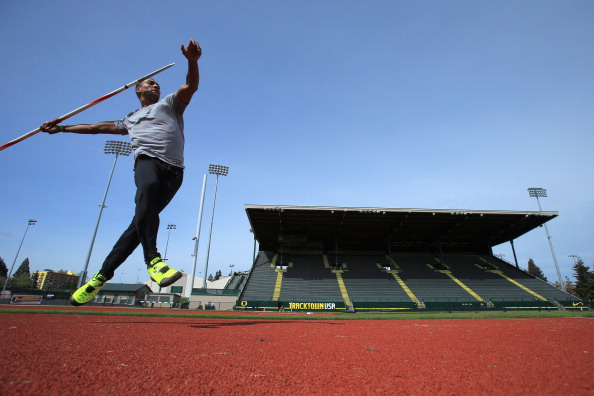Eugene, Oregon, is a beautiful little town. It has many virtues. The issue at hand is whether it ought to be the track and field ghetto of the entire United States. A more charitable way to put it, of course, would be to call it the track and field capital of the United States.
Because after the announcement this week that the NCAA Division I outdoor track championships from 2015 through 2021 will be held at venerable Hayward Field, there's little doubt that Hayward, and Eugene, and for that matter, Oregon, are poised to be -- if not flat-out are -- at the epicenter of the track and field scene in the United States for essentially the next decade.
Query: is that a good thing?
Hayward staged the 2013 NCAAs. It will play host to the meet next year. Going through 2021 will make it nine straight.
Each year in late May or early June, Hayward puts on a Diamond League meet, the Prefontaine Classic. In 2014, Hayward will be the site of the world junior championships; in 2015, the USA nationals; and in 2016 -- just as in 2012 and 2008 -- the U.S. Olympic Trials.
Meanwhile, Portland -- just up the road -- recently won the right to put on the 2016 world indoor championships.
In Portland, the Oregon Project, with coach Alberto Salazar, is home to some of the world's leading runners, including Mo Farah, Galen Rupp and, now, American teen sensation Mary Cain. Olympic and world decathlon champion Ashton Eaton and Nick Symmonds, silver medalist in the 800 meters at the 2013 Moscow world championships, headline the list of athletes who in recent years have come out of Eugene.
Depending how you see it, this week's NCAA announcement is either brilliant or yet another turn in a disturbing trend to further niche-ify track and field -- to consign the sport to a distant corner of America, to a remote college town in the late-night Pacific time zone where the sport is destined to get noticed every so often, if then.
It must be noted, of course, that track and field in Oregon revolves around Nike. Without Nike there is virtually nothing.
In its elation over the 2021 thing, the University of Oregon put out a news release that maybe was just a little bit over the top. It quoted athletic director Rob Mullens as saying, "Being the birthplace of running in the United States, Track Town USA offers the most unique experiences for both student-athletes and fans alike."
When the biographies of Jesse Owens, Glenn Cunningham, Jim Ryun, Billy Mills and other greats get around to claiming Eugene as the "birthplace of running," that will surely be news. As will the fact that the University of Chicago played host to the NCAA championships virtually every year, 13 times, from 1921-36 (they were at USC in 1934, Cal-Berkeley in 1935).
Meanwhile, giving credit where it is due: boosters of the move to see so much action in Eugene, like Vin Lananna, the farsighted senior university associate athletic director who is also president of the entity that is itself called TrackTown USA, envision Hayward being a permanent site for the NCAA championships, like Omaha, Neb., is for men's baseball, or Oklahoma City for softball.
And that's fine.
But there are two key distinctions.
One, Omaha's convention and tourism bureau, for instance, recognized that it was unlikely to be a so-called "big-league" town like nearby St. Louis or Kansas City. Those cities actually really do have NFL and Major League Baseball teams.
So to build the Omaha "brand," they aggressively sought the College World Series and have bid successfully in recent years for events such as the U.S. Olympic Trials in swimming. They are concededly after a wholesome, family-style vibe.
Eugene is hardly in competition with Portland or Seattle. And maybe track and field is after the family scene and maybe it's after the die-hard -- nobody is quite sure what audience it's after. That's for sure one of the challenges. Another of the many issues facing the sport is that, if you've never been to an evening at the track before, you often leave after three -- or more -- hours feeling you're not quite sure what you've just seen.
At any rate, the key distinction is this:
Track is the No. 1 sport at the Summer Olympics. You can like it or not, Omaha and Oklahoma City, but baseball and softball are no longer in the Games.
Moreover, everyone in Eugene and, for that matter, Oregon, you can this it or not as well, but the IAAF, track's international governing body, wants more in the United States. Way more. They look at this country, and they see New York, Los Angeles, San Francisco, Chicago, Houston, Dallas, Miami, big cities, all these huge and important markets, and the only activity seemingly going on of note is in Eugene, or Portland, and Portland is hardly a top TV market, and they ask -- huh?
And that, friends, is altogether a reasonable question if you want track and field to stop being a niche sport in the United States.


